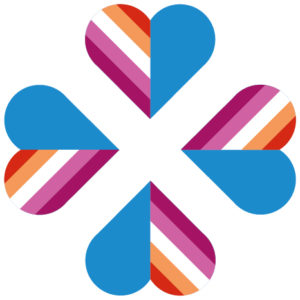Lesbian Visibility: What does being visible mean to you?
Pictured: Anna Smith, Staff Pride Network Bookclub Coordinator
What does being visible as a lesbian mean to you?
In lieu of any formal events to celebrate Lesbian Visibility Week, one of our co-chairs and bi-rep, Katie, and our book group coordinator, Anna have had a virtual discussion (over email, fitting in between their busy work schedules!) about what it means to Anna to be visible as a lesbian.
Katie: The big question: what does being visible as a lesbian mean to you?
Anna: As a teenager coming to terms with my sexuality, I found the label ‘lesbian’ a useful one. It helped explain me, first and foremost to myself. Others had felt what I was feeling, had made sense of it and were out living their lives. My sexuality and gender presentation – things that marked me as different from my family and most of my friends at the time – also connected me into a wider community of people, existing in the past, present and future. Seeing lesbians in public life reinforced the idea that my identity was legitimate and not something to be ashamed of. As an adult I now try to be visible wherever appropriate, both to signal to lesbians who may be struggling to come out (either to themselves or others) that they’re not alone, and to signal to society in general that we’re a normal part of their world, too. I also hope that this visibility will help me to use my privilege as a relatively well-represented identity within the LGBTQ+ spectrum to be an ally to and advocate for others whose identities are not yet recognised or celebrated.
Katie: Thank you so much for sharing that, I was wondering if you could expand on a few things for me? You refer to seeing lesbians in public life as important – was this generally or was it specific, perhaps well-known, figures that were helpful?
Anna: When I was a teenager it was generally people in the arts such as the author Sarah Waters and the musicians Tegan and Sara Quinn who were particularly helpful to me. These women were open about their sexuality, successful in their fields and were creating work that featured characters and narratives that resonated with me. Lesbian pop-culture websites such as AfterEllen (and later Autostraddle) also helped me feel part of a cultural conversation on lesbian and LGBTQ+ issues at a time when I had very few people in my offline life who I felt I could discuss these things with.
Katie: It just goes to show how important representation is. You also mentioned earlier that being a lesbian is a ‘well represented identity’ could you clarify this a little – do you mean, the average person may know that lesbians exist more so than other LGBT+ identities? Is this related to the fact there are now some quite famous lesbians in public life, politicians and celebrities etc…?
Anna: Yes, I think ‘lesbian’ is an identity that the average non-LGBTQ+ person will have at least heard of and that many people will understand. For example, I would not expect to have to educate my colleagues, my boss or my GP on the basics of what being a lesbian means. I think this is partly down to the visibility of lesbians in public life, and in particular lesbians working on the creative side of the media in which we are depicted, for example lesbian film-makers, television writers etc. Other folks in the LGBTQ+ community don’t have that luxury because there are always more barriers in place for trans, pansexual or non-binary people (for example) trying to get a platform from which to tell their stories than for gay or lesbian people. Sadly, prejudice from the gay and lesbian communities towards more marginalised sexual and gender identities often contributes to this problem.
Katie: Do you have anything else to add?
Anna: Representation of lesbians has come a long way in recent years due to the work of activists both in and outside the public eye. However, there’s still some way to go, particularly in terms of increasing visibility for lesbians with other intersecting identities such as race, class and disability. I’m hopeful that in the future lesbians (and indeed any LGBTQ+ person), regardless of their situation or background, can see themselves accurately represented in society.

